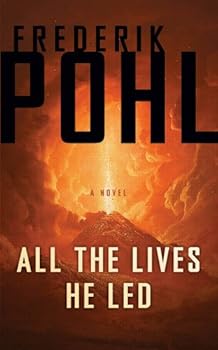
![]() All the Lives He Led by Frederik Pohl
All the Lives He Led by Frederik Pohl
Frederik Pohl sold his first work in 1937; seventy-four years later, a new novel hit the selves. I don’t think many authors can boast such a long career. I’ve read several of Pohl’s novels as well as Platinum Pohl, a best of collection of short fiction, and I very much like the often slightly satiric nature of his work. The second half of the 1970s are usually considered the best period in his writing career, but Pohl has been producing a steady stream of new books, sometimes in collaboration with others, in the last two decades. The only book from this late period in his career I have read was The Last Theorem, his collaboration with Arthur C. Clarke. It was also the first book by Pohl I read, so, perhaps unfairly, I saw it mostly as Clarke’s last novel back then. Thinking back on it, I can more clearly see Pohl’s hand in the novel.
All the Lives He Led is set in the year 2079 and tells the unusual life story of Brad Sheridan. Brad lives in a world that has changed drastically from ours after the supervolcano in Yellowstone erupted and covered a large part of the USA in ash. The decline of US military and economic power has changed the balance of power considerably. In a multi-polar world, no one is really in control, giving rise to countless small and large terrorist groups with a wide variety of causes they fight for. None of that interests Brad; he is just a small-time criminal whose family has lost their wealth to Yellowstone. To support his parents he eventually sells the only thing he possesses, his labour, and heads east to work under indenture in Cairo. When his slightly illegal sideline trading threatens to get him in trouble again, it is time to move: to Italy this time, where he has an opportunity to work at a theme park dedicated to the eruption of the Vesuvius that destroyed the Roman town of Pompeii two-thousand years ago. It is not the end of his troubles, though.
Pohl uses a first person point of view; Brad tells us his story looking back on events, which is a choice that limits him somewhat over the course of the novel. Brad, although in the possession of a generous dose of street smarts, is not a terribly well-educated man. The author makes this apparent with the voice he gives Brad. It’s a straightforward way of speaking, not very philosophical or inclined to challenge the reality of his day-to-day life. I guess Pohl must have found it hard to keep this way of writing going for the entire novel, since he slips a number of times along the way, changing into a tone of voice that does not fit what we know of Brad very well. Still, I have a weakness for first person points of view, so overall I quite enjoyed this aspect of the novel.
That is not to say there aren’t aspects I had more problems with. Brad is not a character who has an eye toward what is going on in the world around him unless it influences him directly. He introduces what is going on in the world, and how it gets him in trouble, when it becomes important to him. Unfortunately that makes the plot of All the Lives He Led a bit of a ramble. The objectives of the people who get Brad into trouble remain unclear for much of the novel, with the reader only finding out what is going on when the penny drops for Brad. The first part of the novel seemed lacking direction because of this. It might have been me, but it took me forever to figure out the motives of the people who put Brad in such a predicament.
When the motives do become clear, Pohl has some serious trouble making me believe them as well. The author has often worked environmental themes, overpopulation in particular, into his stories. One early example can be found in his 1953 collaboration with C.M. Kornbluth, The Space Merchants. In this novel it pops up again, with one of the characters making a good case, in a rather roundabout way, for reducing the world’s population. Of course their proposed solution is so drastic that even a man who is not adverse to conning people out of money, or even outright robbery, is going to entertain the thought for more than a moment. It made the conclusion of the novel a bit bland. The moral dilemma Brad faces is not such a difficult choice after all.
Although I generally enjoy Pohl’s writing, I don’t think this is a particularly strong example of his work. There is the slightly satiric tone that is his trademark, of course. The novel reads quickly but when it comes to the plot and the first person narration, I’m not terribly impressed. The scope and impact of the events Brad describes seem to be a bit of far-reaching than the first person point of view can carry. All the Lives He Led is an entertaining read but doesn’t reach the level of some of Pohl’s other novels. This may be something a real completest will want to read, but I had hoped for a bit more.


I've thought about picking that one up. The artwork looks perfect.
I like the way you think, Bill. I found the second one particularly objectionable; the one with Khan. It was…
I find if I take every Trek reference out of them (the title, the character names, the ship names, etc.),…
I loved this deep dive into Edwige Fenech's Giallo films! Her performances add such a unique flavor to the genre.…
It would give me very great pleasure to personally destroy every single copy of those first two J. J. Abrams…